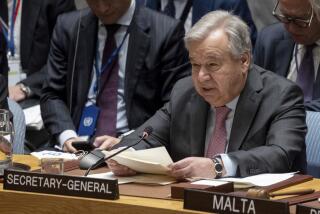Palestinian Group Now Treated as a Nation : PLO’s New Status Tests U.N.’s Protocol
- Share via
UNITED NATIONS — The United Nations, the 159-member body that has provided the Palestine Liberation Organization with one of its most effective international platforms, this week grappled with recent changes in the PLO’s status and took a procedural step Wednesday that could have potentially far-reaching effects.
The 15-member U.N. Security Council, in an unprecedented move, accepted a request made directly by the PLO to address the chamber.
The right to petition directly for a chance to speak is normally reserved for U.N. members with full status as nations; organizations must be invited to speak. Until Wednesday, it had been denied to the PLO, as well as other “liberation movements” and states such as Switzerland that maintain only observer missions to the United Nations.
The PLO’s decision last November to proclaim an independent Palestinian state has thrown the United Nations, always a procedure-oriented organization, into a frenzy of negotiations. While largely symbolic, Wednesday’s decision could help determine whether the world community will recognize the Palestinians’ claim to statehood.
The Palestinian request came as the United Nations debated a resolution deploring the U.S. downing of two Libyan fighters over the Mediterranean on Jan. 4. The United States voted alone against granting the PLO the new status, arguing that it would “diminish” the Security Council’s ability to play a constructive role in the Mideast peace process.
France, Britain and Canada abstained in the vote, approved 11-1.
The latest step comes on the heels of two recent U.N. decisions that have raised the PLO’s status in small ways. Against the backdrop of Washington’s new willingness to talk with the PLO, Arab diplomats say the group’s star is on the rise.
Formal Name Changed
On Dec. 20, the U.N. General Assembly adopted a resolution changing the formal name of the PLO’s United Nations observer mission to the “Palestine Observer Mission.” The move was intended to reflect U.N. acceptance of the PLO’s Nov. 15 declaration of a state with undefined borders.
That step followed a Nov. 28 report by the U.N. Legal Committee recommending that the PLO and another “liberation movement” with U.N. observer status--the South-West Africa People’s Organization--be permitted to issue documents directly under the U.N. imprimatur, rather than seeking the sponsorship of a member nation.
Formal acceptance of the PLO as a U.N. member state would require approval by the Security Council, where the United States would be likely to veto the proposal, and by the General Assembly.
But many of the Palestinians’ friends argue that Wednesday’s move is one of the first steps toward a still more formal recognition of Palestine as a state by the world community.
“The enhanced legal and jurisdictional status that (the PLO) has received has to be reflected in all the organs of the United Nations,” Clovis Maksoud, the Arab League’s U.N. ambassador, told the Security Council.
American critics of the moves say that, collectively, they have eroded the effectiveness with which the United Nations in general, and the Security Council in particular, will be able to serve as intermediary in Mideast peace negotiations.
“By carrying on with this, the PLO annoys us, and they make the Security Council a less acceptable forum (for an international conference on Mideast peace) to the people to whom it needs to be acceptable--Israel,” said an American diplomat.
More to Read
Sign up for Essential California
The most important California stories and recommendations in your inbox every morning.
You may occasionally receive promotional content from the Los Angeles Times.












